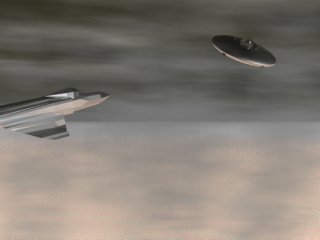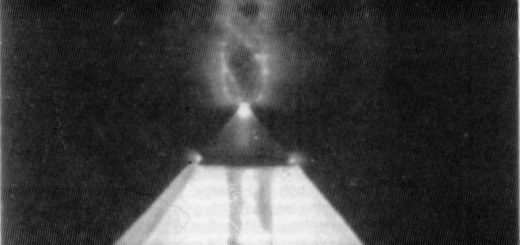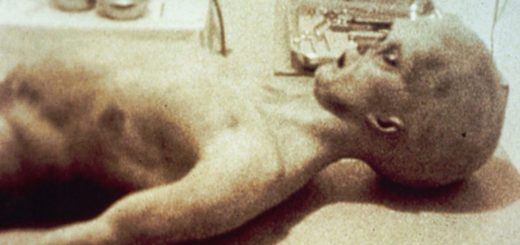Lt. Gorman’s Dogfight with a UFO, 1948

One of the early “classics” of UFO history involved Lieutenant George F. Gorman of the North Dakota Air National Guard, who said he had a twenty-seven minute “dogfight” with a UFO in the skies above Fargo.
Date: October 1, 1948-Location: Fargo, North Dakota
Gorman, then manager of a Fargo construction company, told this story to Air Force investigators:
On the night of October 1, 1948, he had been on a cross-country flight with his squadron. Upon return to Hector airport in Fargo, he elected to log some night flying time, so he remained airborne after the other planes had landed. He had circled his F-51 over the lighted football stadium and around the city and was preparing to land about 9 P.M.
The control tower cleared him to land, advising him about a Piper Cub in the vicinity – the only other plane – and he could see the light aircraft outlined plainly about 500 feet below him. What appeared to be the taillight of a plane passed him on the right, but the tower insisted they knew of no other planes in the area.
Gorman informed the tower that he was going to investigate the other aircraft and pulled his F-51 up and out toward the moving light. He closed to within about 1,000 yards and took a good look at the object.
“It was about six to eight inches in diameter, clear white, and completely round without fuzz at the edges [i.e., sharp and clear]. It was blinking on and off. As I approached, however, the light suddenly became steady and pulled into a sharp left bank. I thought it was making a pass at the tower.
I dived after it and brought my manifold pressure up to sixty inches but I couldn’t catch up with the thing. It started gaining altitude and again made a left bank, I put my F-51 into a sharp turn and tried to cut the light off in its turn. By then we were at about 7,000 feet. Suddenly it made a sharp right turn and we headed straight at each other. Just when we were about to collide, I guess I got scared. I went into a dive and the light passed over my canopy at about 500 feet. Then, it made a left circle about 1,000 feet above, and I gave chase again.”
Gorman said he cut sharply toward the light, which was once more coming at him. When collision again seemed imminent, the object shot straight up into the air in a steep climb-out, disappearing overhead. Gorman again attempted to pursue it but his plane went into a power stall at about 14,000 feet, and the object was not seen again. It was then 9:27 P.M.
Gorman was so shaken by the encounter that he had difficulty handing his plane, although he was a veteran pilot and a flying instructor during World War II. He had noticed no sound, odor, or exhaust trail from the object during the “dogfight,” and no deviation on his instruments. At times during the chase, he had pushed the F-51 to full power, sometimes reaching 400 mph. He described the object as round and somewhat flattened.
In the airport control tower, traffic controllers Lloyd D. Jensen and H. E. Johnson also saw a strange light near the airfield:
“After passing to the east of the airport it seemed to take a northwest heading, The object seemed to be at about 2,000 feet and appeared to be traveling at quite an excessive speed compared to a Piper Cub that was east of the field at the time. No definite outline could be identified. Both objects [the UFO and the Piper Cub] were sighted at the same time.” Jensen said that through binoculars he sighted,
“an object or a light traveling at a high rate of speed, apparently on a southwest heading. The F-51 [Gorman’s plane] was some distance behind and the object was traveling fast enough to increase the spacing between itself and the fighter. The object appeared to be only a round light, perfectly formed, with no fuzzy edges or rays leaving its body.
The edges were clear cut. No other shape was observed. The main identifying characteristic was the high rate of speed at which it was apparently traveling.” The pilot of the Piper Cub, Dr. A. E. Cannon, and his passenger, Einar Nielson, also witnessed the swiftly moving light while in radio communication with the tower:
“While circling the football field at NDAC at 1,600 feet, Fargo tower advised us that there was an F-51 in the air and a few moments later asked us who the third plane might be,”
Cannon said, “We had noticed the 51 and when we were over the north side of Hector field going west, a light, seemingly on a plane, passed above and to the north, moving very swiftly toward the west. At first we thought it was the 51, but we then saw the light of the 51 higher and move over the field. We landed on Runway 3, taxied to the administration building, and went up to the tower and listened to the calls from the 51, which seemed to be trying to overtake the plane or lighted object, which then went southwest and over the city.
The object was moving very swiftly, much faster than the 51. We tried to get a better view with a pair of binoculars, but couldn’t follow it well enough.”
In a statement to Major D. C. Jones, commander of the 17th Fighter Squadron at Hector airport, Gorman said he was convinced that there was “thought” behind the maneuvers:
“I am also convinced that the object was governed by the laws of inertia because its acceleration was rapid but not immediate, and although it was able to turn fairly tight at considerable speed, it still followed a natural curve.”
The object could outturn and outspeed the F-51, he said, and was able to attain a much steeper climb and to maintain a constant rate of climb far in excess of the F-51.
“When I attempted to turn with the object, I blacked out temporarily due to excessive speed,” Gorman stated. “I am in fairly good physical condition and I do not believe there are many, if any, pilots who could withstand the turn effected by the light and remain conscious.”
George F. Gorman retired from the Air Force in 1969 with the rank of Lieutenant Colonel and was then living in Texas.
B J Booth



 Creators of mankind
Creators of mankind Description of “Tall white aliens”
Description of “Tall white aliens” Where they came from?
Where they came from? About hostile civilizations
About hostile civilizations The war for the Earth
The war for the Earth “Tall white aliens” about eternal life
“Tall white aliens” about eternal life Video: “Nordic aliens”
Video: “Nordic aliens” Aliens
Aliens Alien encounters
Alien encounters The aliens base
The aliens base UFO
UFO Technology UFO
Technology UFO Underground civilization
Underground civilization Ancient alien artifacts
Ancient alien artifacts Military and UFO
Military and UFO Mysteries and hypotheses
Mysteries and hypotheses Scientific facts
Scientific facts


















